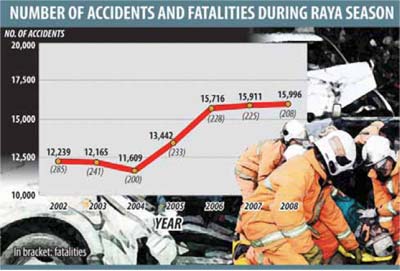|
2009/09/24 
Itís been four years since the Road Safety Department was set up to find ways to reduce road deaths and improve driving skills. Its director-general Datuk Suret Singh said it will be a long ride before there is a drop in the number of fatalities. He tells MINDERJEET KAUR what needs to be done
Q: What would you consider to be the low points in your work to promote road safety?
A: There are many challenges. For instance, not many countries in the world have small capacity bikes. After Vietnam, we have about eight million kapchai bikes. Small bikes are light and fast, and the riders are constantly weaving in and out of traffic. Yearly, we see an average of 3,800 motorcyclists being killed on the roads. If we could have more motorcyclist lanes, we could reduce fatalities by 80 per cent. Public transport must improve. If the public transport system is efficient, more people will use it.
Our third challenge is to improve ambulance service. We are working with the Health Ministry to have an ambulance at an accident scene within 10 minutes.
We also want the pedestrian facilities at wet markets, hawker centres and tourist destinations to be improved. Q: In your opinion, what are the main reasons for poor safety on Malaysian roads? On a scale of 1 to 10, how would you rate our road safety?
A: I would say 5. We still depend on external enforcement rather than self regulation. We are quite disappointed with the man on the street. They still use the handphone while driving, beat traffic lights, abuse emergency lanes, overtake at prohibited zones. There is a lack of intelligent drivers. Most of them break road regulations for 10 to 15 years and they are still alive. So they continue breaking the rules. Q: How would you rate road safety in Malaysia when compared to our Asian neighbours?
A: We are better off than most Asian countries except for Singapore and Brunei. And based on the initiatives taken to improve road conditions and road safety, most of the countries look up to us. Q: What are the ingredients for road safety? Is it attitude? Knowledge? Road conditions?
A: The most important element for road safety is the driver's behaviour. Then comes the road condition and mechanical error. Our ultimate aim is to have a five-star driver, in a five-star car, on a five-star road. Q: How would you describe Ops Sikap over the years?
A: The first Ops Sikap was in 2000. The idea was born after 390 fatalities were recorded during the Raya season in 1999 which averaged out to 23 deaths a day. There was a hue and cry. The following year, we began Ops Sikap and the fatalities averaged 15 a day. Q: Ops Sikap uses a lot of manpower. It is costly too. Can we not supplement this with better use of technology, for instance satellite tracking, high-speed camera surveillance?
A: That is the best option. But it will take time. At present, Ops Sikap uses manpower but it is the best immediate option at hand. Other options are good but it involves a lot of money. We have been pushing for automated enforcement cameras for two years and we are still looking at the tenders and regulations. We will also have to amend the law. We have also been pushing for rear safety belts for years. We had to get the stakeholders and others involved before making it mandatory. We want to move towards that but it will take time. For instance, the Commercial Vehicle Licensing Board requires all buses to have a Global Positioning System. It is working well. But it is not easy to ask all cars to have the system. Q: What is the most effective way to minimise road accidents? Stiffer penalties? Road safety educational programmes like workshops, seminars? What about suspending driving licences?
A: The most effective way is self regulation. When people are aware of the economic sense, security and the happiness of their family, it will gradually improve. Enforcement and suspension of driving licences are short-term measures.
Q: There is a perception that our roads are not safe as before.
A: We carried out an international road assessment programme which covered 3,600 kilometres. We found our expressways to be much saferbut we need to improve federal and state roads. We need to put up guard rails and build barriers in the middle of the roads as there are many head-on collisions. We also have to upgrade road markings and have more motorcycle lanes. We have found the quality of our roads is good.
Source: http://www.nst.com.my/Current_News/NST/articles/8interview-2/Article/index_html |





